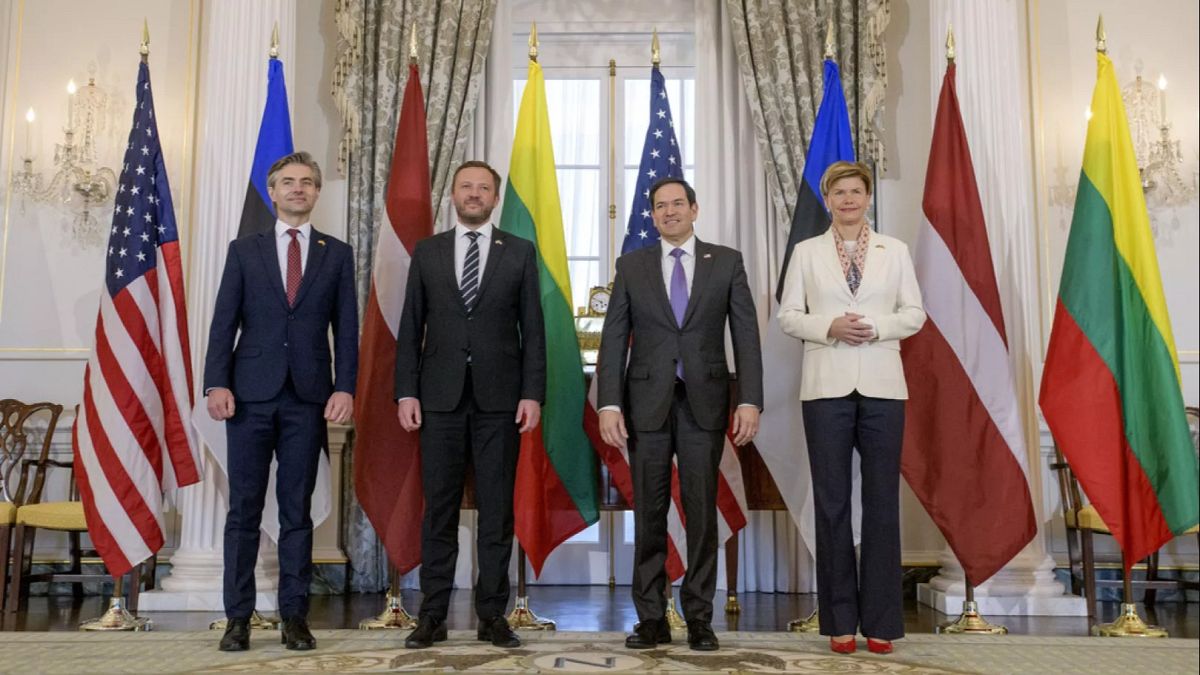Social media users are claiming that Estonia, Latvia and Lithuania have come out against a ceasefire in Russia’s war in Ukraine, as talks to bring about a temporary halt stall.
One post on X says that the countries are “afraid” that an “undefeated” Russian army will invade them once a ceasefire is reached in Ukraine.
Another says that the Baltic states believe a ceasefire would give Moscow time to rearm and turn its attention to its borders with NATO.
Others share images that appear to depict Russian forces advancing towards Estonia, Latvia and Lithuania.
But the spirit of many of these posts ranges from misleading and unnuanced to outright disingenuous.
The origin of the distorted claims appears to be a report published by the Financial Times in late March, which said that Baltic defence ministers had warned that a ceasefire in Ukraine would dramatically increase the security threat to their countries.
Estonia’s defence minister Hanno Pevkur reportedly told the FT that when the war in Ukraine comes to an end, Russia will quickly redistribute its forces, rapidly increasing threat levels.
His comments came after his Lithuanian counterpart Dovilė Šakalienė made similar remarks that “Russia won’t be done after Ukraine”.
“Let’s not have any illusions. Let’s not lie to ourselves that Russia is going to be done after Ukraine,” she said. “Russia will use this time following a ceasefire to speed up its military capabilities. They already have a huge, battlefield-trained army, which is going to get even bigger.”
While the US has brokered talks between Ukraine and Russia, negotiations appear to have stalled. Kyiv agreed to halt hostilities in the Black Sea and a US-backed 30-day ceasefire, but Moscow has only agreed to stop attacking energy infrastructure and says it will only agree to the Black Sea deal if Western economic sanctions are lifted.
Pevkur reportedly told the FT that of the 600,000 Russian troops currently estimated to be in Ukraine, 300,000 would probably be redeployed in the event of a ceasefire.
“These men will not go back to different parts of Russia to harvest the corn or do something else, because the salary they are getting in the army is like five to 10 times more than what they could get in their home town,” he said.
Of particular concern is the large-scale military exercise known as Zapad, according to the FT, which is conducted by Russia and Belarus every four years to simulate a conflict with NATO countries. Its due to take place again later this year.
Both Pevkur and Šakalienė also reportedly warned against redeploying any NATO troops from their countries to Ukraine after the war, as a means to deter Russia from attacking again.
“We cannot jeopardise the security of the eastern flank of NATO,” Pevkur said, according to the FT report. “We cannot fall into the trap that our forces are somehow fixed in Ukraine. Then we will have risks at our border.”
So it’s true that the Baltics are concerned about what a ceasefire in Ukraine would mean for them. But it’s wrong to say they are against a stop to the fighting.
The Baltics’ official line
Spokespeople for Estonia and Latvia’s foreign affairs ministries told EuroVerify that the countries are completely committed to reaching a ceasefire in Ukraine.
They denied the online claims, noting that their countries support efforts to achieve peace in Ukraine and that they continue to back Kyiv.
“In short: these social media claims are false,” the spokesperson for the Ministry of Foreign Affairs of Estonia said. “Estonia supports efforts to achieve a just and lasting peace in Ukraine. A just peace is based on international law, including the principles of territorial integrity and sovereignty. A just peace also means that crimes are punished and damages are compensated.”
They accused Russia of imposing new preconditions for reaching a ceasefire, and Russian President Vladimir Putin of seeking “the complete subjugation of Ukraine and a fundamental restructuring of European security”.
“Russia must stop attacking Ukraine’s civilian and energy infrastructure and fulfil the ceasefire conditions, which also ensure the safe passage of merchant ships in the Black Sea,” the Estonian spokesperson continued. “So far, Russia has shown no willingness to meet these conditions. On the contrary, Russia’s goals and methods have not changed, and attacks on Ukraine’s infrastructure and civilians continue.”
Similarly, a spokesperson for the Ministry of Foreign Affairs of Latvia assured that the country seeks peace.
“We all want peace that is just, comprehensive, and lasting,” they told EuroVerify. “The only country that we don’t see to be ready for peace is Russia […] All indicators when we look at Russia, the political, the economical, the military, religion, media, private sector, they are all oriented towards war. We don’t see a single indicator that they are moving towards peace.”
“Latvia’s security is closely tied to Ukraine’s fight for independence,” they added. “Therefore, in 2024, Latvia and its people have continued providing Ukraine with military, political, financial, and humanitarian support. Latvia — and the Baltic states overall — are among Ukraine’s largest supporters in proportion to GDP.”
The Ministry of Foreign Affairs of Lithuania did not respond to our request for comment.

